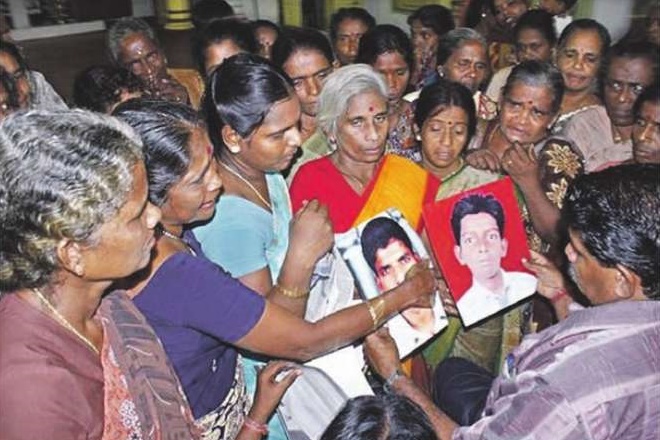By PK Balachandran
The Sri Lankan government is in a bind over two important commitments it had solemnly made two years ago, one to the electorate of Sri Lanka, and the other to the UN Human Rights Council (UNHRC) in Geneva.
Maithipala Sirisena and Ranil Wickemesinghe became Sri Lanka’s President and Prime Minister respectively by promising a new democratic constitution, wherein, power will be vested in Parliament and not in an Executive President, and wherein, the provinces will be given a sufficient amount of autonomy.
And to get out of the hook at the UNHRC, where there had been charges of war crimes against it, the government signed the International Convention for the Protection of All Persons from Enforced Disappearances in December 2015, and promised to incorporate it in the country’ domestic law.
buy lexapro online buy lexapro online no prescription
But in the two years since they assumed office, President Maithripala Sirisena and Prime Minister Ranil Wickremesinghe find themselves unable to fulfill these commitments.
The constitution making process went on smoothly with the various sub-committees working hard to submit very forward looking reports. But these reports have got stuck in the Steering Committee comprising the heads of all parliamentary parties.
Key issues like Devolution of Power, Nature of the State (Whether it should be unitary or federal), and the exact position of Buddhism and other religions are to be decided here. But there has been no forward movement with the various parties expressing divergent opinions.
Though the government had drafted a bill to ban enforced disappearances as per the relevant international convention, it failed to present it to parliament as planned on Wednesday. The Leader of the House, Lakshman Kiriella, said that the bill could not presented as planned, because several government MPs wanted more time to study it.
Basic Reasons
However, the real reason for delaying the drafting of a new constitution and presenting the disappearances bill is that they could be highly controversial from the point of the Sinhala-Buddhist majority community.
As per conventional Sri Lankan political wisdom, the majority community will reject devolution of power to the Tamil-majority Northern Province, which to them, appears to be in cahoots with the Western powers who are accusing the heroic Sri Lanka Security Forces of committing “war crimes” and the government of conducting a continuous “genocide”.
As it happened, the Mahanayakes (Prelates) of the leading Buddhist Nikayas (Orders) Malwatte, Asgiriya and Ramannya, who have influence over the majority Sinhala-Buddhists community, recently met and took a decision to oppose the drafting of a new constitution and the incorporation of the international convention on enforced disappearances in domestic law. They saw no need for any change.
Reportedly they also opposed the move to amend the Prevention of Terrorism Act (PTA).
With elections to some of the Provincial Councils being due early next year, and the moral cum political compulsion to hold the much-postponed local body elections, the ruling coalition is treading warily on these issues.
Rajapaksa Fires Warning Shot
A warning shot about the dire political consequences of going ahead with the inclusion of the Convention on Disappearance in domestic law was fired by the Joint Opposition leader and former President, Mahinda Rajapaksa, recently.
He said that Western powers could arrest Sri Lankans for crimes allegedly committed in Sri Lanka, if Sri Lanka incorporates into its domestic law, the International Convention for the Protection of All Persons from Enforced Disappearances.
The convention enables foreign countries to seek the extradition of a Sri Lankan who is suspected, accused or convicted, of having caused enforced disappearances in Sri Lanka. When such a request is made, the government of Sri Lanka is obliged to inform the foreign country of the measures it intends taking to prosecute or extradite that person, he said.
Further, it empowers any member State to arrest anybody, even a foreigner present within its jurisdiction, on suspicion of having been involved in enforced disappearances in any other country. The State that carries out such an arrest can prosecute the suspect without extraditing him to his own country.
Most significantly, a suspect arrested in that manner, can be handed over to an international criminal tribunal even if the suspect’s own country does not come under the jurisdiction of that international tribunal, Rajapaksa pointed out.
“The proposed law is an attempt to subject our armed forces to international war crimes prosecutions without using the term ‘war crimes’ and rephrasing it as ‘disappearances’. The use of the word ‘disappearances’ makes this look like an innocuous attempt to trace missing persons. However the purpose of this proposed legislation is not to trace missing persons but to hunt down and prosecute those who won the war against terrorism,” he warned.
World Powers Not Signed Convention
Rajapaksa said that countries like the United States, Britain, Australia and Canada, never even signed this convention. Denmark, Finland, Norway, Sweden, Ireland and India signed it ten years ago in 2007, but never ratified it.
“Many countries have kept away from this Convention altogether for the obvious reason that its provisions have the potential to violate the individual rights of citizens of the States that join it,” he said.
Since Rajapaksa is still thought to have a hold on the Sinhala-Buddhist majority, it is not surprising that government MPs have developed cold feet.
As for the fate of the new constitution, the government might be expected to be very cautious. It is using the provision for a referendum in it to deflect criticism that a small group of people, beholden to the minorities and the West, are plotting to foist an unacceptable constitution on the majority.
(– P.K.Balachandran is a senior Colombo-based journalist writing on the countries of South Asia –)
Opinion: Sri Lanka in a bind over disappearances bill and new constitution

